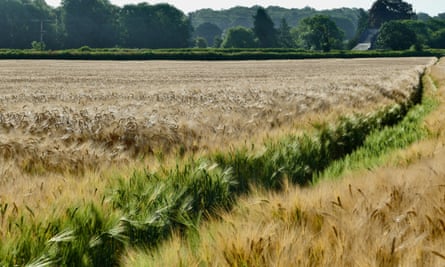UK farmers have warned that harvests of wheat, oilseed rape, potatoes and other crops have been hit by the cool, wet summer, raising fears of further food price inflation.
The wettest July on record for parts of the UK risks colliding with rising prices of essential ingredients on global markets due to the ongoing conflict in Ukraine and unpredictable weather affecting harvests from southern Europe to China.
The cost of wheat made its first monthly climb in nine months in July, according to the UN Food and Agricultural Organization, because of uncertainty about Ukrainian grain exports since Russia’s decision last month to terminate the Black Sea grain deal, which had guaranteed safe shipment from Ukraine’s seaports. Russia’s subsequent attacks on Ukrainian port infrastructure on the Black Sea and River Danube pushed international wheat prices up by 1.6% last month, according to the UN food price index.
The rice price index hit its highest level in almost 12 years in July, after rising 2.8% last month alone, according to the UN. The increase came after India banned exports of non-basmati white rice on 20 July, in a bid to curb domestic food inflation after heavy rains hit crops in the world’s largest exporting nation. In China’s Heilongjiang region, known as its “great northern granary”, floods have submerged farms and devastated crops.
That could pose more headaches for central banks in their battle against inflation. The Bank of England this week warned that UK households will be struggling with double-digit food inflation into next year as processers remain saddled with expensive energy contracts.
Feargal Shortall, the Bank’s director for monetary analysis, said the current rate of food inflation of 17% was unlikely to fall below 10% by the end of the year, based on feedback from farmers, distributors and food manufacturers who said their own costs were continuing to rise at a fast pace.
Many British crops are being harvested at least a fortnight later than usual, either because they were planted late due to the cold start to the spring, or because farmers are battling inclement weather and waterlogged fields.
The delays and wet weather are affecting the quality of crops, with over-ripe or storm-battered oilseed rape pods shattering and losing their seed, barley heads breaking off and potatoes rotting or attracting blight.
Yields for oilseed rape, one of the earlier crops to be brought in, are averaging 3 tonnes a hectare, according to the government-backed Agriculture and Horticulture Development Board, after a shorter flowering period than usual due to dry and warm weather in the spring, storm damage and pest damage.
James Peck at PX Farms, who has 12,500 acres in Cambridgeshire and Lincolnshire on which he grows a mix of crops including oilseed rape, oats and wheat, said his oilseed rape harvest was likely to be as much a fifth lower than hoped after hail damage and delays.
Some of his wheat crops had also been flattened by rains while the dry June stunted grain, meaning harvests in Cambridgeshire are down by as much as a quarter. “The weather we are getting now we needed in May or June,” he said.
Will Shakeshaft of Greens of Soham, who grows potatoes, beetroot and onions in East Anglia and also works with farmers across the country to supply crisp-makers such as Walkers and Golden Wonder with potatoes, said his crops had also been affected by the wet weather. Daily yields per hectare are down by as much as a fifth, as wet soil clings to the potatoes so they take longer to process and hold up machinery.
after newsletter promotion
He said potato growers in Cornwall and the south-west had experienced a “terrible season” with yields as much as 30% down. In East Anglia it was about 18% behind but harvests in the Midlands, north-west and Yorkshire were better. “It’s a bit of a battle,” he said.
Farmers’ costs are also being pushed up by the cost of drying damp crops after harvest so they can be stored safely. Peck said he was spending about 7% of the cost of his products on drying, biting into his already tight profit margins. He said fertiliser prices had soared to £692 a tonne last year when farmers were establishing crops, from about £190 the previous year.

Matt Culley, the National Farmers’ Union’s combinable crops board chair, said farmers’ profits were being hit as many were being forced to harvest damp crops before they became over-ripe and damaged enough to drop in price because they did not meet the quality promised.
“We are looking at a break-even year if at all. Our input costs are the highest we’ve ever had for fertiliser and then we have higher diesel, labour and machinery costs. Parts and spares have risen massively,” he said.
Shakeshaft said the rising costs were not being recognised by buyers, with supermarkets in particular set on prices coming down. “They believe we should be in deflation as costs should have gone through the system, and they are expecting cheaper food but we are still paying more for tyres for tractors and on wages.”

